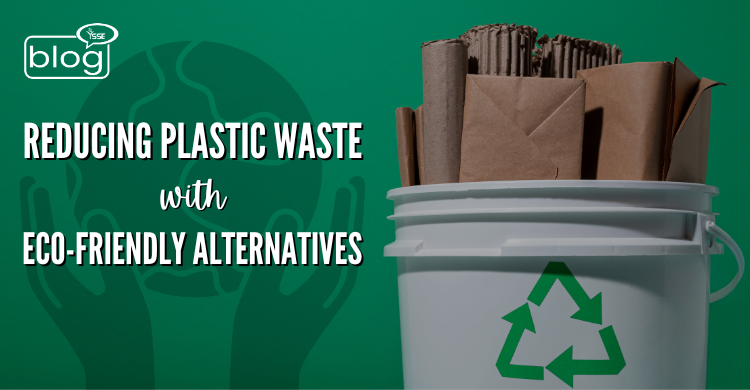Plastic waste is a universal problem everywhere. Plastic waste by millions of tons is flushed into landfills, oceans, and streets every year. Plastic waste harms the environment, animals, and even human life. The good news is that we can reduce plastic waste by replacing plastic with nature-friendly substitutes.
Why Is Plastic Trash Such a Huge Issue?
Plastic is used so widely because it is cheap, light, and durable. But these same qualities make plastic a huge issue for the planet. Plastic does not break down like natural materials do. Instead, it breaks down into tiny fragments called microplastics, which persist in the environment for hundreds of years. Microplastics find their way into water sources, food chains, and even the air we inhale. In addition, plastic waste is detrimental to wildlife. Plastic is misidentified as food by animals and ingested, which can be lethal. Aquatic animals such as turtles and seabirds are typically most impacted. Fossil fuel-based production of plastics also contributes to global warming.
Eco-Friendly Alternatives to Plastic
The best method of plastic pollution is using eco-friendly materials. Below are some of the environmentally friendly plastic alternatives that would make a great difference:
- Reusable Bags rather than Plastic Bags
Plastic bags are utilized for a few minutes but take centuries to degrade. A more sustainable option is the use of cloth, jute, or recycled material reusable bags. They are stronger, longer-lasting, and reduce the consumption of single-use plastics.
- Bamboo and Metal Straws instead of Plastic Straws
Plastic straws are some of the most common ocean litter. It is a simple alternative to replace them with bamboo, stainless steel, or glass straws to avoid plastic pollution. They are reusable and eco-friendly alternatives to plastic ones.
- Glass and Stainless Steel Containers rather than Plastic Storage
The majority of people store food in plastic containers, but they can leach poisonous chemicals when heated. Glass and stainless steel containers are healthier and more durable and will not leach toxins into food.
- Compostable Cutlery rather than Plastic Spoons and Forks
Single-use plastic cutlery amounts to massive waste. Compostable cutlery made from cornstarch, wood, or bamboo is a great alternative. These biodegrade and do not create any kind of environmental damage.
- Beeswax Wraps instead of Plastic Wrap
Food is covered with plastic wrap but cannot be easily recycled. Beeswax wraps, made of cotton cloth covered with beeswax, are the eco-friendly option. They are biodegradable, reusable, and keep food fresh without harming the environment.
- Using refillable bottles rather than single-use ones
An estimated billions of plastic water bottles are thrown away annually. Using a glass or stainless steel water bottle can save money and reduce plastic waste over time.
- Bar soap in plastic bottles as opposed to liquid soap
Usually packaged in plastic bottles, liquid soap adds to waste. A great substitute is bar soap, particularly the natural varieties. They are more environmentally friendly, require less packaging, and last longer.
Easy Steps to Reduce Plastic Waste
Simple lifestyle changes can also contribute to reducing plastic use in addition to using alternatives.
- Bring Your Own Shopping Bag: Always carry a reusable bag with you to avoid plastic bags.
- Say No to Plastic Straws: Restaurants now offer paper or metal straws. If not, carry your own reusable straw.
- Buy in Bulk: Purchasing household and food items in bulk reduces packaging waste.
- Support Brands That Use Sustainable Packaging: Choose products that have minimal packaging or biodegradable packaging.
- Recycle Properly: Sort the plastic waste and recycle it.
- Spread Awareness: Educate family and friends to do the right thing.
Little things have big effects. Together, we can lessen the demand for plastic manufacture if each person makes an effort to use less plastic. It will protect the ecosystem, preserve marine life, and lessen the negative health effects of plastic. Many nations and businesses are outlawing single-use plastics. We can hasten the shift to a cleaner and greener world by supporting the process.
Avoiding plastic trash is not as hard as it may appear. We can simply reduce plastic pollution if we choose green alternatives and make minor lifestyle adjustments. Whether it is the use of a carry bag, substituting plastic straws with bamboo, or avoiding plastic packing, every step counts.
Let us unite and save our world for our children by saying no to plastic and yes to sustainability.
To read more blogs, click here.
Writer,
Sudipto Banik
Intern, Content Writing Department
YSSE

